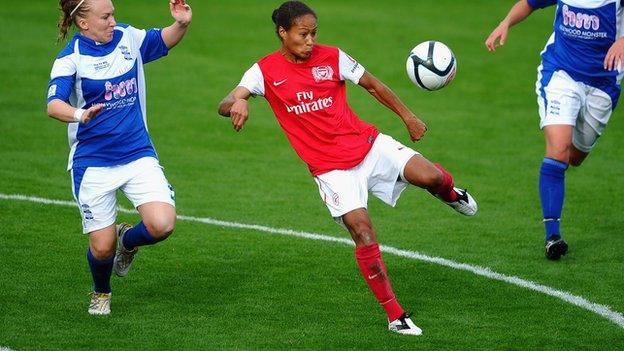Rachel Yankey: England footballer keen to inspire next generation
- Published
Rachel Yankey: Inspiring the next generation
Football is all Rachel Yankey has known for almost two decades.
From the days when she would pretend to be a boy just to get a game, to becoming one of England's elite players... it has transformed her from a street-wise kid to a business-owning professional.
"I left school with no GCSEs, not knowing who I was or what I was going to do," Yankey tells BBC Sport. "And I've turned out playing for England - being the most capped footballer - and I own my own company. These are things that I never dreamed of when I left school."
Yankey has always felt at home on the football pitch, even when she had to hide her true identity as a child.
"It's a bit embarrassing now," Yankey recalls. "Me and two of my boy friends used to play football all the time, and when they went off to join a new local football team I wanted to join too.
"We didn't understand as kids that it wasn't accepted for girls to play football, until we actually got there and it was all boys."
They hatched a plan involving calling her Ray (an acronym of her full name: Rachel Aba Yankey) and Yankey's mother was horrified when her eight-year-old daughter returned home with a shaved head.
"The plan was to just disguise myself to get a game of football," Yankey says. It was two years before her cover was blown and she was forced to find a girls-only team.
Since then, Yankey's honours have included 10 top-flight league titles, an MBE for services to the sport and appearances at two World Cups and three European Championships.
Yankey has been picked for the forthcoming World Cup qualifier against Belarus, but at the age of 33, with the next major tournament still two years away, does she ever consider hanging up her boots?

Yankey scored a wonder goal against Birmingham City as Arsenal Ladies won the 2011 FAWSL Cup
"When I stop enjoying it as much, when I'm not good enough, maybe…" Yankey trails off, folding her arms to give it more thought. "People that have retired have told me that you'll just know," she adds.
Retirement has long been a contentious issue for sportspeople. Some of Britain's most well-known, such as former cricketer Freddie Flintoff and ex-boxer Ricky Hatton, revealed they became depressed when they retired. And the bleak picture painted by BBC documentary Football's Suicide Secret makes it unsurprising Yankey is not yet ready to end her career.
"When I watched Clarke Carlisle's documentary, I can see why so many footballers become depressed, why so many footballers don't know themselves and don't have a pathway (after retirement)," she says.
"These are the questions I'm asking myself now: who am I if I haven't got football? Because I really don't know."
Yankey made her mark on the game from a young age. She burst onto the international scene in 1997, scoring on her debut as a fresh-faced 17-year-old.
She also built a prolific domestic career at Arsenal Ladies, winning every title on offer.
And she further boosted her profile when she became England's first full-time professional woman footballer with Fulham Ladies in 2000, a team backed by Mohamed Al Fayed, then owner of the men's club.
"For me it was just a game," Yankey remembers. "When I was a 17-year-old kid, asking if I wanted to play football [for England] was like asking me if I wanted to play down the park - I would have played anywhere."
It is different now. Every time she pulls on the England jersey, it carries the gravitas of being an experienced, senior international and she admits to feeling a "sense of responsibility".
"There are a lot of young, talented players and I need to make sure that having played 129 times I show them my experience and help them come through," she says.
Inspiring the next generation has been a priority for some time. She runs the Rachel Yankey Football Programme, which introduces schoolchildren to the importance of diet and teamwork as well as teaching them the game.
There is no multi-million pound fortune for women footballers to fall back on whey they retire (or while they are playing for that matter), so finding another job is necessary.
"Projects like this are what I want to stay heavily involved in - the coaching side and educating youngsters," Yankey says.
"It's important for any youngster to look up to someone who has been there and done it, that you can Google, that you can watch on TV. It's special.
"I'm very grateful for what football has given me - now it's time to pay back."
- Published12 July 2013
- Published9 September 2013
- Published17 February 2013